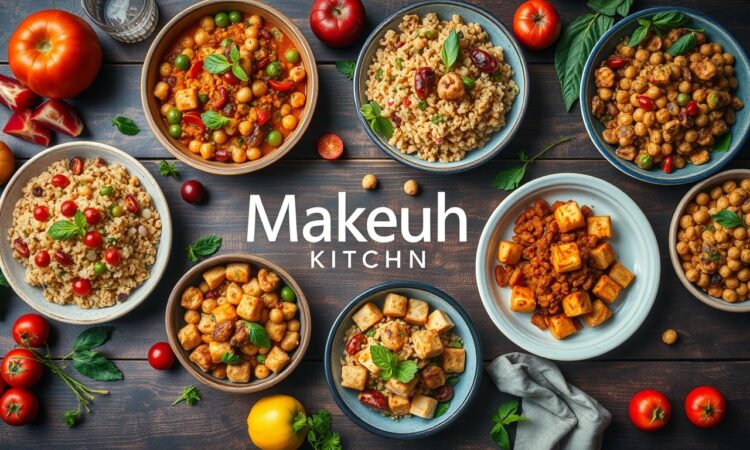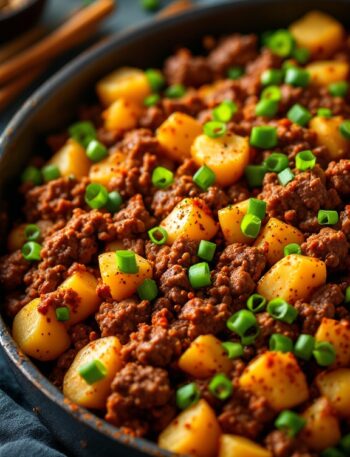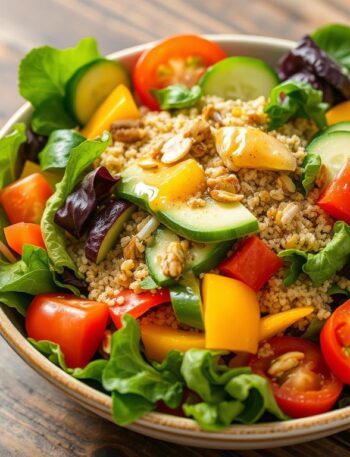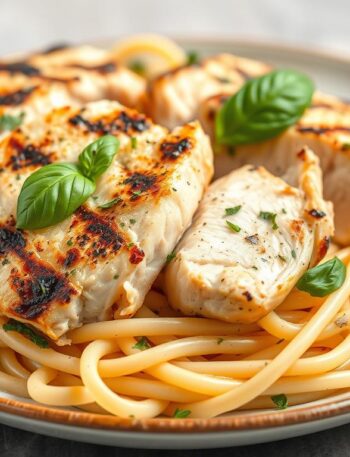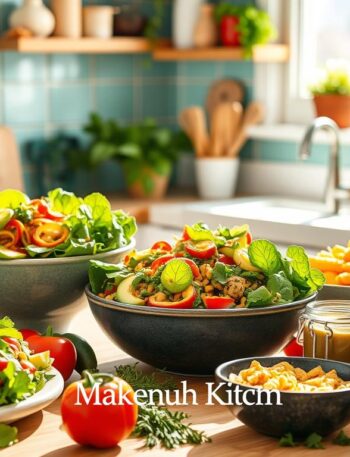Vegan lifestyles are becoming more popular for various reasons. Getting enough protein is crucial for vegans. High-protein vegan meals help maintain muscle mass and support overall health.
With the right ingredients, you can create tasty plant-based meals. These meals are packed with protein and energy-boosting nutrients. They’ll keep you satisfied and energized throughout the day.
A colorful flat lay of high-protein vegan dishes, featuring a variety of ingredients like quinoa bowls, chickpea salads, lentil stew, and tofu stir-fry, beautifully arranged on a rustic wooden table. Vibrant fruits and vegetables complement the dishes, with subtle hints of herbs and spices. The scene should evoke a sense of freshness and nourishment, showcasing the essence of healthy eating. Brand name “Makenuh Kitchn” subtly incorporated into the design without text.
Lentil soups and chickpea stews are great protein sources. Protein-rich grains like farro and quinoa are also excellent choices. Tofu is a versatile soy-based protein that can be prepared in many ways.
Nuts and seeds boost protein intake too. Almonds and chia seeds provide healthy fats and fiber. They’re easy to add to various dishes for extra nutrition.
Vegan protein powders can be used in sweet treats. Try making brownies, flapjacks, or cookies with them. Mix almond flour, cocoa powder, and plant-based milk for tasty, protein-packed snacks.
Key Takeaways:
- High-protein vegan recipes are essential for maintaining muscle mass and supporting overall health
- Lentils, chickpeas, and tofu are excellent sources of plant-based protein
- Nuts, seeds, and grains like farro and quinoa contribute to protein intake
- Vegan protein powders can be used in sweet treats for guilt-free indulgence
- With the right ingredients, vegan meals can be delicious, satisfying, and energy-boosting
The Importance of Protein in a Vegan Diet
Protein is vital for muscle health, especially for those on a plant-based diet. Vegans need to get enough protein from various sources. There are many plant-based options that provide essential amino acids for your body.
Vegans need about 10% of their calories from protein. Most vegan diets provide 10-12% of calories from protein. Active adult male vegans need 2.2 to 2.6 grams of protein per 100 calories.
Active adult female vegans need 2.3 to 2.8 grams of protein per 100 calories. Vegans may benefit from eating 0.5 grams of protein per pound of body weight daily.
Current recommendations suggest that vegans may benefit from consuming around 0.5 grams of protein per pound of body weight per day, slightly higher compared to non-vegans.
To meet protein needs, add various plant-based sources to your meals and snacks. Some great options include:
- Legumes (beans, lentils, chickpeas)
- Soy products (tofu, tempeh, edamame)
- Whole grains (quinoa, amaranth, buckwheat)
- Nuts and seeds (hemp seeds, chia seeds, pumpkin seeds)
- Nutritional yeast
| Vegan Protein Source | Serving Size | Protein Content |
|---|---|---|
| Cooked Quinoa | 1 cup (185g) | 8g |
| Tofu | 3 oz (85g) | 8g |
| Tempeh | 3 oz (85g) | 11g |
| Edamame | 1/2 cup (85g) | 8g |
| Hemp Seeds | 3 tbsp (30g) | 10g |
Protein helps repair muscles, curb hunger, and address cravings. It also enhances bone health and supports muscle retention during weight loss. Plan your meals to include various high-protein vegan foods.
This way, you’ll meet your nutritional needs while enjoying a tasty plant-based diet. Balance is key to a satisfying vegan lifestyle.
Vegan Protein Açaí Bowls: A Superfood Breakfast
Kickstart your day with a tasty vegan protein açaí bowl. This nutrient-packed breakfast keeps you energized and full all morning. Açaí berries boast more antioxidants than blueberries, supporting overall health when combined with protein-rich ingredients.
Ingredients for a Protein-Packed Açaí Bowl
Gather these ingredients for your vegan protein açaí bowl:
- 1 frozen banana
- ½ cup frozen blueberries
- 1 packet unsweetened açaí
- 1/3 cup non-dairy Greek yogurt
- 1 scoop vegan protein powder (pea or hemp)
- 1/4 cup plant-based milk (almond, coconut, or oat)
Personalize your bowl with various toppings. Try fresh fruits, dried fruits, nuts, shredded coconut, dark chocolate chips, and granola. These add extra flavor and texture to your meal.
How to Make a Vegan Protein Açaí Bowl
- In a blender, combine the frozen banana, frozen blueberries, açaí packet, non-dairy Greek yogurt, vegan protein powder, and plant-based milk.
- Blend the ingredients until smooth and creamy. For a thicker consistency, avoid adding too much milk during blending.
- Pour the blended mixture into a bowl.
- Top your açaí bowl with your favorite toppings, such as sliced fresh fruits, dried fruits, nuts, shredded coconut, dark chocolate chips, and granola.
- Enjoy your vegan protein açaí bowl immediately for the best taste and texture.
Smoothies and smoothie bowls are best served fresh but can be stored for up to 24 hours in the fridge or up to 1 week in the freezer.
This recipe packs over 35 grams of protein and about 350 calories per serving. It’s a balanced meal with a healthy mix of carbs, protein, and fat. Açaí bowls can range from 300-700 calories, depending on ingredients and toppings.
| Nutrient | Amount per Serving |
|---|---|
| Calories | 350 |
| Protein | 35g+ |
| Fiber | 8g |
| Omega-3 Fatty Acids | 1g |
Make vegan protein açaí bowls part of your breakfast routine. They’re packed with superfoods, antioxidants, and plant-based protein. Try different toppings to keep your taste buds excited and your body nourished.
Quick and Easy Vegan Protein Smoothies
Vegan protein smoothies are tasty and handy for fueling your body after a workout. They offer quick plant-based protein to help repair muscles. These smoothies are packed with essential nutrients for recovery.
Making a vegan protein smoothie is simple. Blend vegan protein powder with a ripe banana, frozen berries, and plant-based milk. Add a handful of chia seeds for extra nutrition. This mix creates a creamy, filling smoothie.
Here are some protein-rich options for your vegan smoothie:
- Vegan protein powder (15-30 grams of protein per serving)
- Pea protein isolate (16 grams of protein per 2 tablespoons)
- Silken tofu (12 grams of protein per ½ cup)
- Hemp hearts (10 grams of protein per 3 tablespoons)
- Natural peanut butter or almond butter (7 grams of protein per 2 tablespoons)
Boost your smoothie’s nutrients by adding spinach, kale, or ground flax seeds. A scoop of vegan yogurt can also add extra vitamins and minerals. These additions support overall health and well-being.
The beauty of vegan protein smoothies lies in their versatility. With countless combinations of fruits, vegetables, and plant-based protein sources, you can create a different flavor and nutrient profile every day.
| Smoothie Recipe | Calories | Protein |
|---|---|---|
| Avocado Spinach Smoothie | 293 kcal | 18g |
| Peanut Butter Protein Smoothie | 286 kcal | 16.8g |
| Berry Protein Smoothie | 230 kcal | 15.7g |
| Chocolate Banana Smoothie | 258 kcal | 22g |
Adding vegan protein smoothies to your daily routine provides essential nutrients. They’re great for breakfast, post-workout recovery, or a healthy snack. These smoothies are perfect for anyone following a plant-based diet.
Overnight Oats: A Convenient High-Protein Vegan Breakfast
Craving a protein-packed vegan breakfast with minimal morning fuss? Overnight oats are your answer! This tasty meal prep option suits various diets, including vegan, gluten-free, and oil-free.
With simple ingredients and planning, you’ll have a satisfying breakfast ready each day. Just mix, refrigerate, and enjoy!
Ingredients for Vegan Protein Overnight Oats
For high-protein vegan overnight oats, gather these ingredients:
- Rolled oats
- Plant-based milk (such as soy milk for added protein)
- Coconut yogurt
- Vegan protein powder (optional)
- Chia seeds
- Maple syrup
- Vanilla extract
- Toppings of your choice (e.g., fresh fruit, nuts, hemp hearts)
Combining these ingredients creates a filling breakfast with over 20 grams of plant-based protein per serving. Soy milk offers about 8 grams of protein per cup.
Hemp hearts pack a protein punch too, providing 10 grams in just 3 tablespoons. These additions boost the overall protein content significantly.
Preparing Your Overnight Oats
Mix oats, plant milk, yogurt, protein powder, chia seeds, maple syrup, and vanilla in a container. Stir well, cover, and refrigerate overnight.
Come morning, your oats are ready to eat. Enjoy them cold or add toppings for extra flavor and texture.
Try fresh berries, sliced banana, chopped nuts, or hemp hearts for more protein. The options are endless!
| Ingredient | Protein Content | Other Benefits |
|---|---|---|
| Soy Milk | 8 grams per cup | High in protein compared to other plant-based milks |
| Hemp Hearts | 10 grams per 3 tablespoons | Contains essential vitamins and minerals |
| Chia Seeds | 4 grams per 2 tablespoons | High in fiber, helps regulate digestion |
| Rolled Oats | 5 grams per 1/2 cup | Fiber-rich, promotes gut health |
This recipe is both convenient and versatile. Customize it to fit your taste and dietary needs. Use gluten-free oats or swap in sunflower seed butter for nut-free options.
Get creative and experiment with flavors. You’ll never tire of this nourishing breakfast staple. Enjoy your protein-packed overnight oats!
Indulgent Vegan Protein Pancakes
Craving a tasty, protein-packed breakfast that’s vegan-friendly? These pancakes are the answer! Made with red lentils, buckwheat flour, and cashew milk, they’re both nutritious and delicious.
Each serving packs 24 grams of protein and 12 grams of fiber. That’s enough to keep you full and energized all morning.
The recipe makes 12 pancakes, each with about 115 calories. They have a unique, nutty flavor from buckwheat and white rice flour. Corn starch gives them a crispy edge.
You’ll need a high-power blender, non-stick pan, and electric griddle. Prep takes 5 minutes, cooking 5 minutes, and lentil soaking 1 hour.
These vegan protein pancakes are a game-changer! I love how they’re both delicious and nutritious, and the fact that they’re so easy to make is a huge bonus.
Here’s a breakdown of the nutritional information per serving (3 pancakes):
| Calories | Carbohydrates | Protein | Fat |
|---|---|---|---|
| 425 kcal | 50g | 24g | 16g |
These pancakes are super versatile. Top them with maple syrup, nut butter, or fresh fruit. They’re perfect for busy mornings.
Leftover pancakes keep well. Store them in the fridge for 4 days or freeze for up to 2 months.
Vegans and non-vegans alike will love these protein-rich pancakes. With a 4.9 out of 5 rating, they’re sure to become your new breakfast favorite.
Vegan Protein Brownies: Satisfying Your Sweet Tooth
Craving a fudgy brownie that’s vegan and high in protein? These vegan protein brownies are perfect for you. They’re packed with almond flour, cocoa powder, and vegan protein powder. You’ll love these healthy treats that taste amazing.
These brownies are full of good stuff. They’ll satisfy your sweet tooth and give your body important nutrients. You’ll want to make these over and over again.
Ingredients for Vegan Protein Brownies
You only need a few simple ingredients to make these tasty vegan brownies:
- 1 and 1/2 cups mashed overripe banana
- 3/4 cup peanut butter or almond butter
- 1/3 cup cocoa powder
- 1/3 cup chocolate vegan protein powder
- 2 tsp vanilla extract
- 1/4 tsp salt
- 1/2 cup dairy-free chocolate chips
These brownies are vegan, dairy-free, gluten-free, and grain-free. They’re great for people with different food needs or likes.
Baking Your Vegan Protein Brownies
Making these brownies is easy. Mix the banana, nut butter, cocoa powder, protein powder, vanilla, and salt. Then fold in the chocolate chips and pour into a lined baking dish.
Bake at 350°F (180°C) for 20-22 minutes. Check with a toothpick – it should come out mostly clean. Let the brownies cool before cutting into 9 pieces.
Each serving has good nutrition:
| Nutrient | Amount per serving |
|---|---|
| Calories | 253 kcal |
| Protein | 12 g |
| Fat | 16 g |
| Carbohydrates | 34 g |
| Fiber | 5 g |
| Sugar | 10 g |
Store extra brownies in an airtight container in the fridge for up to 4 days. You can also freeze them for up to 1 month.
These vegan protein brownies are a game-changer for anyone looking to enjoy a guilt-free, protein-packed treat. With their rich, chocolatey flavor and satisfying texture, you won’t even miss the traditional ingredients!
On-the-Go Vegan Protein Flapjacks
Vegan flapjacks are perfect for quick, delicious snacks on the go. They’re easy to make and packed with protein. These portable treats are great for hiking or midday energy boosts.
Mix rolled oats, vegan protein powder, almond butter, maple syrup, melted coconut oil, and vanilla extract. Press into a lined baking dish. Bake for 20-25 minutes at 180°C (350°F).
Once cooled, slice the flapjacks into your desired shape and size. You’ll have a protein-rich snack ready for your next adventure.
These flapjacks are versatile and customizable. Swap ingredients or add dried fruits, nuts, or seeds to suit your taste.
I love making a big batch of these vegan flapjacks on the weekend, so I have a healthy snack to grab throughout the week. They’re perfect for taking on hikes or enjoying as a post-workout treat. – Sarah, outdoor enthusiast
Vegan flapjacks offer numerous health benefits. They’re packed with protein from vegan powder and almond butter. These snacks keep you full and satisfied between meals.
Oats provide fiber and slow-release energy to keep you going all day. They’re both delicious and nutritious.
| Ingredient | Amount |
|---|---|
| Rolled oats | 80g |
| Vegan protein powder | 25g |
| Almond butter | 270g |
| Maple syrup | 70g |
| Coconut oil, melted | 30ml |
| Vanilla extract | 1 tsp |
Try these vegan protein flapjacks for your next outdoor adventure. They’re also great for quick, healthy snacks at home. Your body will love the taste and nutrition.
High-Protein Vegan Recipes: Savory Waffles with a Twist
Vegan waffles can be a savory, protein-packed meal. They’ll keep you full and energized all day long. With a few ingredients and a waffle iron, you can make a tasty, nutritious breakfast.
Ingredients for Vegan Protein Waffles
To make these high-protein vegan waffles, you’ll need:
- 1 cup all-purpose flour or gluten-free all-purpose flour
- ⅓ cup vanilla-flavored pea protein powder
- 1 tablespoon sugar
- 1 teaspoon baking powder
- 1 cup unsweetened plant-based milk
- 2 tablespoons melted coconut oil
These ingredients create a waffle batter with 8 grams of protein per serving. Two mini waffles make one serving. The pea protein adds plant-based protein without changing the texture or taste.
Cooking Your Vegan Protein Waffles
Now it’s time to cook your vegan waffles:
- Preheat your waffle iron and grease it lightly with coconut oil to prevent sticking.
- Pour the batter into the waffle iron, making sure to spread it evenly.
- Cook the waffles for about 4 minutes or until they turn golden brown and crispy.
- Remove the waffles from the iron and repeat the process until you’ve used all the batter.
You can store these waffles in the fridge for 3 to 4 days. Or freeze them for up to a month. To reheat, use an air fryer or toaster oven at 350°F for 3 to 5 minutes.
| Nutritional Information (per serving of 2 waffles) | Value |
|---|---|
| Calories | 171 |
| Carbohydrates | 20g |
| Protein | 8g |
| Fat | 6g |
The versatility of these savory vegan waffles is endless. Top them with avocado, hummus, roasted vegetables, or any other savory toppings you enjoy for a unique and satisfying meal that will keep you energized and nourished.
Tofu waffles are another great high-protein vegan option. They’re easy to make with only 3 ingredients. One serving has 90 calories, 2.9g carbs, 8.5g protein, and 4.7g fat.
Use firm or extra firm tofu for crispy waffles. Slice the tofu thinly for best results. Add chopped chocolate or fresh fruit for extra flavor.
These savory vegan waffles are perfect for meal prep. Make them ahead and reheat quickly for an easy breakfast. Get creative with toppings and enjoy a protein-rich, plant-based meal.
Vegan Protein Cookies: A Healthy Snack Option
Vegan protein cookies are a tasty way to satisfy your sweet tooth. They’re packed with plant-based protein from almond butter, vegan protein powder, and chia seeds. These treats offer a delicious boost to your protein intake without compromising on taste.
Homemade vegan protein cookies are healthier than store-bought options. They contain more protein and fewer calories per serving. You can control the ingredients and tailor them to your dietary needs.
A typical recipe makes 12 cookies, each with 128 calories and 9 grams of protein. They take less than 30 minutes to prepare. These treats can be stored in the fridge for 5 days or frozen for 3 months.
| Ingredient | Percentage | Nutritional Contribution |
|---|---|---|
| Banana | 33% | Natural sweetness and binding properties |
| Peanut Butter | 17% | Healthy fats and protein |
| Almond Flour | 16% | Gluten-free base and nutty flavor |
| Vegan Protein Powder | 9% | Concentrated source of plant-based protein |
| Chocolate Chips | 7% | Indulgent flavor and texture |
| Others | 18% | Additional nutrients and flavors (e.g., chia seeds, vanilla extract) |
These cookies are versatile and can be customized to suit different tastes. You can swap bananas for applesauce to lower sugar content. Flax eggs work as a vegan alternative to regular eggs.
For a nut-free option, try using sunflower seed butter instead of almond butter. This makes the cookies accessible to more people with dietary restrictions.
Vegan protein cookies are a convenient and satisfying snack option. They provide a healthy treat that aligns with your values and dietary choices. Enjoy these homemade delights guilt-free while fueling your body with essential protein.
Conclusion
High-protein vegan recipes are both achievable and rewarding. You can meet your daily protein needs with plant-based ingredients like legumes, tofu, and quinoa. These 10 recipes show the variety of plant-based cooking, from energizing breakfasts to indulgent treats.
Many meals in this collection contain over 30 grams of protein per serving. The Asian-inspired Almond Butter Sauce recipe has 37 grams of protein. It combines tofu, whole wheat pasta, broccoli, almond butter, and sesame seeds.
The Edamame Mash recipe offers 18-20 grams of protein per serving. It’s a perfect choice for a satisfying and nourishing meal.
High-protein vegan recipes support health goals and promote a sustainable lifestyle. Plant-based proteins have a lower environmental impact than animal products. They require less land, water, and energy to produce.
These recipes provide essential nutrients like iron, calcium, and omega-3 fatty acids. These are crucial for healthy bones, teeth, and brain function. Explore high-protein vegan cooking and fuel your body with delicious plant-based meals.
FAQ
Q: What are some high-protein vegan sources?
A: Legumes, nuts, seeds, tofu, tempeh, and seitan are excellent high-protein vegan options. Vegan protein powders made from pea, hemp, or rice are also great choices.
Q: Can I get enough protein on a vegan diet?
A: Absolutely! With proper planning, you can meet your daily protein needs on a vegan diet. Include a variety of plant-based protein sources in your meals.
Q: How much protein do I need per day as a vegan?
A: The RDA for protein is 0.8 grams per kilogram of body weight. Active individuals and athletes may need more protein for muscle repair and growth.
Q: What are the benefits of incorporating vegan protein powders into my diet?
A: Vegan protein powders offer a quick way to boost your protein intake. They’re great for post-workout recovery and can help you meet daily protein needs.
Q: Can I make high-protein vegan meals without using protein powder?
A: Yes, you can create high-protein vegan meals using whole food sources. Legumes, tofu, tempeh, nuts, and seeds are excellent ingredients for protein-rich dishes.
Q: Are high-protein vegan diets suitable for weight loss?
A: High-protein vegan diets can support weight loss when combined with balanced eating and exercise. Protein keeps you full and satisfied, helping prevent overeating.
Q: How can I ensure I’m getting all the essential amino acids on a vegan diet?
A: Eat a variety of plant-based proteins throughout the day to get all essential amino acids. Combine legumes with grains to create complete protein sources.
Q: Are high-protein vegan meals suitable for athletes and bodybuilders?
A: Yes, high-protein vegan meals can meet the needs of athletes and bodybuilders. Many successful vegan athletes have built and maintained muscle mass on plant-based diets.

